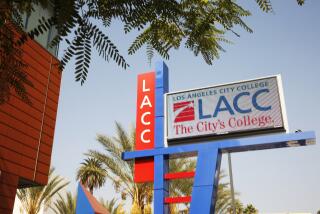Maverick Behind ‘Little Mac’ Foundation
- Share via
The trouble with most foundations, Rick MacArthur says, is that they are associated with all the right people.
John R. (Rick) MacArthur is the young philanthropist who helped engineer the grants from his grandparents’ foundation and the Atlantic Richfield Co. that saved Harper’s magazine five years ago. MacArthur, 29, now serves without pay or expenses as Harper’s publisher.
The boyish-looking MacArthur, a former newspaper reporter, is an unusual figure in the genteel world of organized philanthropy. He is an insider who openly criticizes many common practices of foundations, which are perhaps the most privileged of elite institutions.
And as a director of a family foundation known for its support of controversial and risky ventures, MacArthur puts his grants where his gripes are.
MacArthur thinks that most of the nation’s 23,770 foundations “are in business to please their directors and to please their constituents,” rather than to serve society and that too many lack courage to support new ventures which might prompt criticism.
“Since foundation directors tend to be drawn from local elites, their first priority is to please their constituency, and that means they want to give money to things that are utterly non-controversial,” he said, such as symphonies, museums and hospitals.
As a result, MacArthur said, nonprofit organizations that reinforce the status quo find it much easier to get foundation grants than those that experiment with new ideas. Last year foundations, which have $58 billion in assets, gave away $4.3 billion.
“For a foundation to be successful and to do any good it’s going to have to take big risks,” MacArthur said. But most foundations, he believes, define risk as a four-letter word.
He believes that too many directors and officers regard the endowments entrusted to them as tokens of power and prestige to be used in strengthening their ties to other powerful people rather than as opportunities granting freedom to boldly go forth where no philanthropist has gone before.
MacArthur said that foundations should, as a matter of course, make grants to experimental projects even though some of these experiments are bound to fail. “If you don’t have failures you are not doing your job,” MacArthur contended during an interview in Westwood.
Money in the Family
MacArthur is the grandson of a multibillionaire insurance man whose fortune created America’s third-largest foundation and the son of a multimillionaire whose fortune created one of the country’s most progressive foundations. Formally these two endowments are his late grandparents’ John D. and Catherine T. MacArthur Foundation, with $1.9 billion in assets, and his late father’s J. Roderick MacArthur Foundation, with $23 million in assets, but they are known in philanthropic circles simply as Big Mac and Little Mac.
Young MacArthur has no position on the board of Chicago-based Big Mac, which is best known for its no-strings-attached awards to noted individuals in a variety of fields. But MacArthur did use his connections to its directors, including his father, who died last year, to help arrange the $1.5-million grant from Big Mac that, with an equal sum from the Atlantic Richfield Co., rescued Harper’s, the nation’s oldest monthly magazine, in 1980.
As publisher, MacArthur brought back editor Lewis Lapham, who transformed Harper’s, long a journal of polite liberal opinion, into a lively forum for clashing ideas. Some readers detest the new Harper’s, while others hail it as the most innovative idea for a magazine since Time began.
The risky rescue has worked out well enough that today, MacArthur said, Harper’s still has $2 million from the $3-million rescue fund in the bank and in the first quarter of 1985 it posted its first profit since 1974, earning $35,000. For the year ending next Feb. 28, MacArthur expects Harper’s to lose $100,000, which is just half the loss anticipated in the magazine’s budget and is less money than the endowment should earn in interest.
MacArthur eliminated most discount subscriptions, causing Harper’s circulation to plummet from 325,000 to a low of about 130,000, with a significant drop in advertising rates. But MacArthur said he believes building a solid base of full-rate subscribers--circulation has since revived to 152,000--is a better long-term business strategy. Currently the magazine is running 20 to 25 pages of advertising per issue, which in the view of some industry experts is enough to sustain Harper’s.
MacArthur, with sister Solange D. and brother Gregoire C.R.B. MacArthur, directs Little Mac’s $1-million-per-year grant program, which helps “those who are inequitably or unjustly treated by Establishment institutions.” The Little Mac foundation, based in Niles, Ill., gives much of its money to help poor people organize to fight systematic abuses by powerful interest groups, to help imprisoned writers and support the First Amendment, to promote peace and to support organizations promoting racial equality.
To the Little Mac foundation, “Establishment institutions” is not a code term for conservative or capitalist; the foundation has given money to investigate human rights abuses in both Nicaragua with its Marxist Sandinista government and in El Salvador with its right-wing death squads.
“I’m amused by, disturbed I really should say, by the the blindness of the left and the right that develops, depending on which country they happen to be favoring. . .” he said. “Instead of saying authoritarianism is better than totalitarianism or communism is better than right-wing capitalism or whatever you have to maintain a sense of equality about oppression.”
As a child at family dinner-table discussions, MacArthur first learned about the menaces of unchecked power. His father, who made a fortune in the limited- edition collector’s plate business, taught him that capitalism can encourage civil liberties by creating many competing centers of power, each with a vested interest in protecting its own power to act freely. And, MacArthur said, his father taught him that freedom entails problems and losses as well as triumphs.
Today when Lance E. Lindblom, the Little Mac foundation executive director, recommends a grant and later “comes back and says ‘Well, the litigation failed’ or ‘the organization went bankrupt,’ we never get mad at them,” MacArthur said. Most foundations, he noted, would be angry at their grantee.
The reason, he said, is that Lindblom “has a pretty good track record” of recommending risky ventures that do work and because “what we’re doing is something that, by definition, government can’t get involved in because government cannot take the political risk that we can take. We don’t have a constituency to please and my brother, sister and I don’t give a damn what the nation, the world, thinks about us. “
Too Little Courage
Courage is something that MacArthur said he sees too little of not only in the foundations but in the press, too. A former reporter for the Chicago Sun-Times and the old Washington Star and a UPI editor, MacArthur said he is troubled by what he sees as a growing tendency for the press to accept what government officials say at face value and to adopt the agenda of those in power.
“People should care (if the press is timid) because it is the press that has alerted people to abuses by the government,” MacArthur said, adding that when the press is timid official abuses flourish.
“I went to a symposium sponsored by the Newhouse School of Journalism at Syracuse University and there were people there essentially calling for censorship of the press,” he said. “There’s this common belief that . . . seems to be afoot all over the country among people in all levels of government and of public life that the news media is somehow out of control, that it’s abusive and has gone too far. I think that’s absurd.
“I feel like we’re living through one of the low points in the history of the press. . . . I think the press has essentially, except for a couple of newspapers, followed the lead of the Administration and allowed the Administration to decide what’s important. And as far as I’m concerned that’s not what the job of the press is,” he said.
Too many people, MacArthur said, subscribe only to magazines that reinforce what they already believe, be they right-wingers who read William Rusher’s National Review or left-wingers who read Victor Navasky’s The Nation.
MacArthur believes, however, that “the only way we’re going to find a consensus on issues is by getting people together to write about them and getting people reading something in common where they get an understanding of what the sources (of ideas and viewpoints) are. . . . We need that extreme diversity of opinion in the same magazine, and I don’t think anybody else does it.
In a Harper’s forum titled “Can the Press Tell the Truth?” last January, Tom Wicker, the liberal New York Times columnist, called the press “a gentleman’s club.” MacArthur, paraphrasing Wicker, said he agrees that the press has become a club where the members “never want to get too far out in front of the government because it would offend the other gentlemen in the club, and no one wants to be thrown out of the gentleman’s club.”
More to Read
Sign up for Essential California
The most important California stories and recommendations in your inbox every morning.
You may occasionally receive promotional content from the Los Angeles Times.













